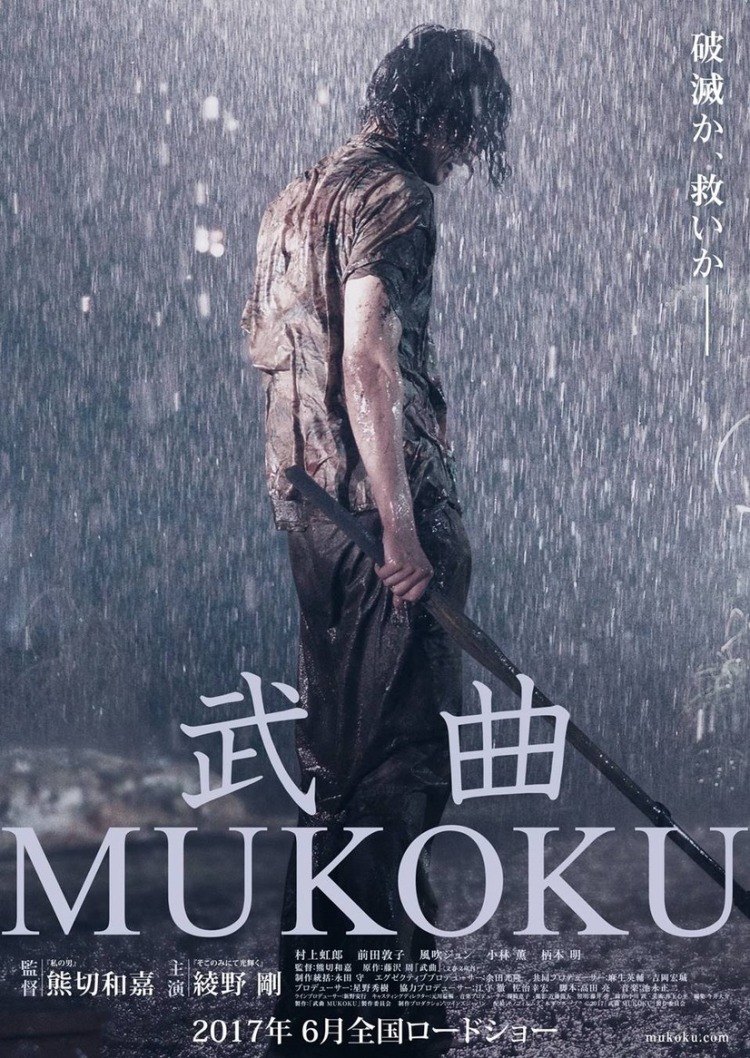 The way of the sword is fraught with contradictions. Like many martial arts, kendo is not primarily intended for practical usage but for self improvement, emotional centring, and fostering a big hearted love of country designed to ensure lasting peace between men. Nevertheless, it tends to attract people who struggle with just those issues, hoping to find the peace within themselves though mastery of the sword. Kazuyoshi Kumakiri’s long and varied career has often focussed on outsiders dealing with extreme emotions and Mukoku (武曲 MUKOKU) is no different in this regard as the two men at its centre lock swords at cross purposes, each fighting something or someone else within themselves rather than the flesh and blood opponent standing before them.
The way of the sword is fraught with contradictions. Like many martial arts, kendo is not primarily intended for practical usage but for self improvement, emotional centring, and fostering a big hearted love of country designed to ensure lasting peace between men. Nevertheless, it tends to attract people who struggle with just those issues, hoping to find the peace within themselves though mastery of the sword. Kazuyoshi Kumakiri’s long and varied career has often focussed on outsiders dealing with extreme emotions and Mukoku (武曲 MUKOKU) is no different in this regard as the two men at its centre lock swords at cross purposes, each fighting something or someone else within themselves rather than the flesh and blood opponent standing before them.
Kengo Yatabe’s (Go Ayano) life has been defined by the sword. As a young boy his father, Shozo (Kaoru Kobayashi), began training Kengo intensively but his standards were high, too high for a small boy who only wanted to please his dad but found himself beaten with the weapon he was failing to master. Twenty years later Kengo is a broken man after a long deferred violent confrontation between father and son has left Shozo in a vegetative state, neither dead nor alive, no longer a figure of fear and hate but of guilt and ambivalence. Kengo has given up kendo partly out of guilt but also as a kind of rebellion mixed with self harm and is currently working as a security guard. He spends his days lost in an alcoholic fog, trailing an equally drunken casual girlfriend (Atsuko Maeda) behind him.
Meanwhile, high school boy Toru (Nijiro Murakami) is a classic angry young man working out his frustrations through a hip-hop infused punk band for which he writes the angst ridden poetry that serves as their lyrics. Toru has no interest in something as stuffy as Kendo but when he’s set upon by a bunch of Kendo jocks he decides he’s not going down without a fight. Winning through underhanded street punk moves would normally be frowned upon but the ageing monk who runs the high school kendo club, Mitsumura (Akira Emoto), is struck by his nifty footwork and decides to convince the troubled young man that the path to spiritual enlightenment lies in mastery over the self through mastery of the sword.
The wise old monk pits the self-destructive older man against the scrappy young one, hoping to bring them both to some kind of peaceful equilibrium, with near tragic results. Kengo’s ongoing troubles are born of a terrible sense of guilt, but also from intense self-loathing in refusing to accept that he’s become the man he hated, as broken and embittered as the father who made him that way. Shozo was a kendo master, but as the monk points out, in technique only – his heart was forever unquiet and he never achieved the the true peace necessary to master his art. Knowing this to be the truth only made it worse yet Shozo also knew the burden he’d placed on his son. They say every man must kill his father, but Kengo can’t let the ghost of his go – clinging on to a mix of filial piety and resentful loathing which is slowly turning him into everything he hates.
Toru’s problem’s are pushed into the background but seeing as his enemy is not the flesh and blood threat of an overbearing father but the elements and more particularly water, it will be much harder to overcome. Water becomes a constant symbol for each man – for Toru it’s an inescapable symbol of death and powerlessness, but for Kengo it represents happiness and harmony in rediscovering the good memories he has of his father from joyful family outings to less abusive summer training sessions. Mukoku is the story of three ages of man – the scrappy rebellious teen, the struggling middle-aged man, and the elderly veteran whose own heart is settled enough to see the battles others are waging. The “warrior’s song” as “mukoku” seems to mean changes with each passing season, nudged into tune by the graceful art of kendo.
Kumakiri embraces his expressionist impulses as a young boy finds himself suddenly underwater, vomiting mud and fish while Kengo has constant visions of his father, mother, and younger self ensuring the past is forever present. The ominous score and strange occurrences including ghostly graveyard old women who appear from nowhere in order to offer a lecture on the five buddhist sins lend a more urgent quality to Kengo’s disintegration, though interesting subplots involving a possibly alcoholic girlfriend and a mamasan (Jun Fubuki) at a local bar who might have been Shozo’s mistress are left underdeveloped. Two men face each other to face themselves, trying to beat their demons into submission with wooden swords, but even if the battle is far from over the tide has turned and something at least has begun to shift.
Screened at Raindance 2017.
Original trailer (no subtitles)


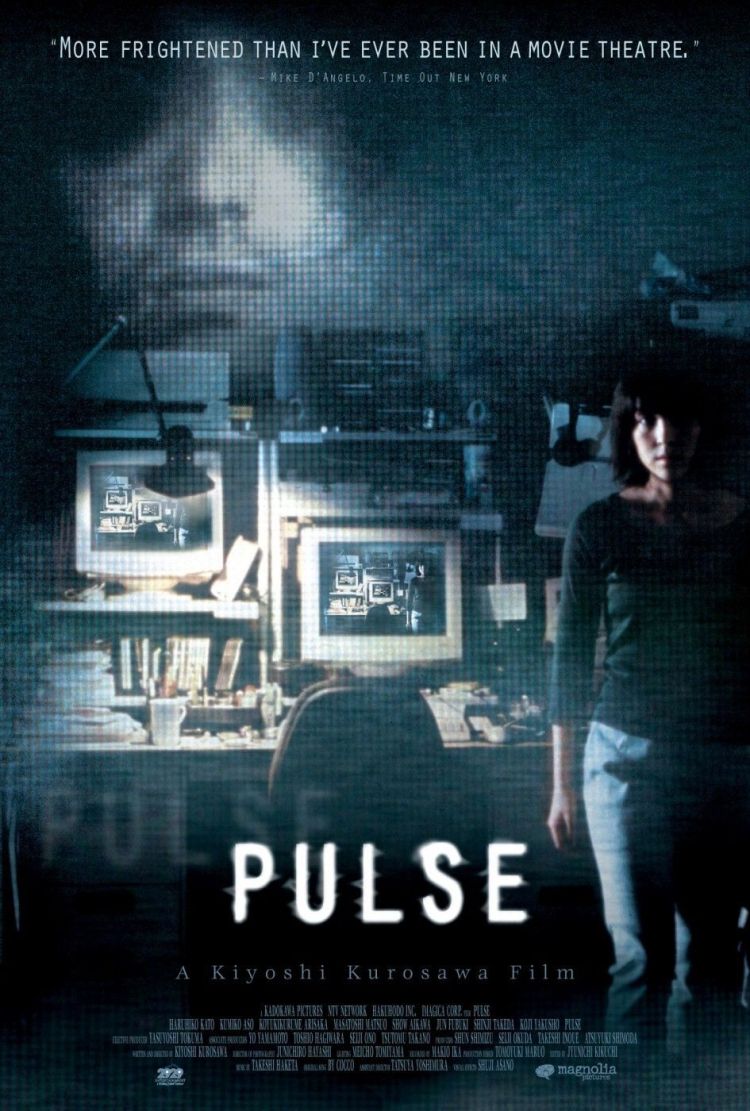 Times change and then they don’t. 2001 was a strange year, once a byword for the future it soon became the past but rather than ushering us into a new era of space exploration and a utopia born of technological advance, it brought us only new anxieties forged by ongoing political instabilities, changes in the world order, and a discomfort in those same advances we were assured would make us free. Japanese cinema, by this time, had become synonymous with horror defined by dripping wet, longhaired ghosts wreaking vengeance against an uncaring world. The genre was almost played out by the time Kiyoshi Kurosawa’s Pulse (回路, Kairo) rolled around, but rather than submitting himself to the inevitability of its demise, Kurosawa took the moribund form and pushed it as far as it could possibility go. Much like the film’s protagonists, Kurosawa determines to go as far as he can in the knowledge that standing still or turning back is consenting to your own obsolescence.
Times change and then they don’t. 2001 was a strange year, once a byword for the future it soon became the past but rather than ushering us into a new era of space exploration and a utopia born of technological advance, it brought us only new anxieties forged by ongoing political instabilities, changes in the world order, and a discomfort in those same advances we were assured would make us free. Japanese cinema, by this time, had become synonymous with horror defined by dripping wet, longhaired ghosts wreaking vengeance against an uncaring world. The genre was almost played out by the time Kiyoshi Kurosawa’s Pulse (回路, Kairo) rolled around, but rather than submitting himself to the inevitability of its demise, Kurosawa took the moribund form and pushed it as far as it could possibility go. Much like the film’s protagonists, Kurosawa determines to go as far as he can in the knowledge that standing still or turning back is consenting to your own obsolescence. Prolific as he is, veteran director Yoji Yamada (or perhaps his frequent screenwriter in recent years Emiko Hiramatsu) clearly takes pleasure in selecting film titles but What a Wonderful Family! (家族はつらいよ, Kazoku wa Tsurai yo) takes things one step further by referencing Yamada’s own long running film series Otoko wa Tsurai yo (better known as Tora-san). Stepping back into the realms of comedy, Yamada brings a little of that Tora-san warmth with him for a wry look at the contemporary Japanese family with all of its classic and universal aspects both good and bad even as it finds itself undergoing number of social changes.
Prolific as he is, veteran director Yoji Yamada (or perhaps his frequent screenwriter in recent years Emiko Hiramatsu) clearly takes pleasure in selecting film titles but What a Wonderful Family! (家族はつらいよ, Kazoku wa Tsurai yo) takes things one step further by referencing Yamada’s own long running film series Otoko wa Tsurai yo (better known as Tora-san). Stepping back into the realms of comedy, Yamada brings a little of that Tora-san warmth with him for a wry look at the contemporary Japanese family with all of its classic and universal aspects both good and bad even as it finds itself undergoing number of social changes. You know how it is. You work hard, make sacrifices and expect the system to reward you with advancement. The system, however, has its biases and none of them are in your favour. Watching the less well equipped leapfrog ahead by virtue of their privileges, it’s difficult not to lose heart. Asakura (Yusaku Matsuda), the (anti) hero of Toru Murakawa’s Resurrection of Golden Wolf (蘇る金狼, Yomigaeru Kinro), has had about all he can take of the dead end accountancy job he’s supposedly lucky to have despite his high school level education (even if it is topped up with night school qualifications). Resentful at the way the odds are always stacked against him, Asakura decides to take his revenge but quickly finds himself becoming embroiled in a series of ongoing corporate scandals.
You know how it is. You work hard, make sacrifices and expect the system to reward you with advancement. The system, however, has its biases and none of them are in your favour. Watching the less well equipped leapfrog ahead by virtue of their privileges, it’s difficult not to lose heart. Asakura (Yusaku Matsuda), the (anti) hero of Toru Murakawa’s Resurrection of Golden Wolf (蘇る金狼, Yomigaeru Kinro), has had about all he can take of the dead end accountancy job he’s supposedly lucky to have despite his high school level education (even if it is topped up with night school qualifications). Resentful at the way the odds are always stacked against him, Asakura decides to take his revenge but quickly finds himself becoming embroiled in a series of ongoing corporate scandals.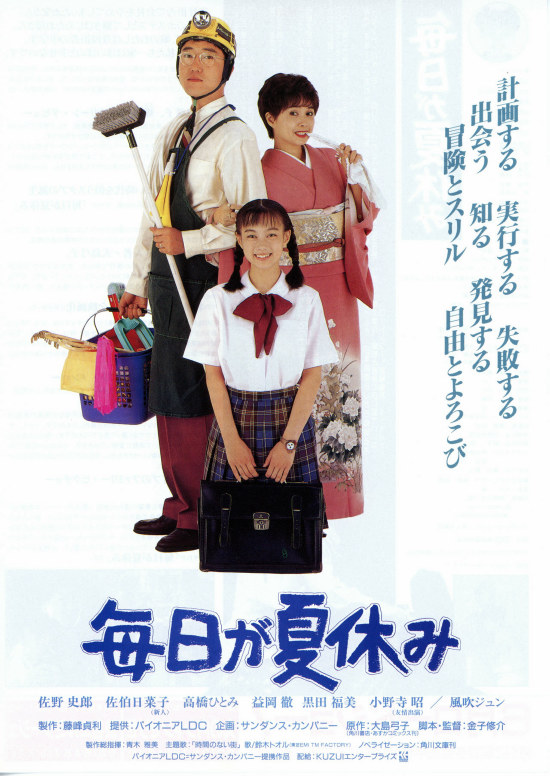 Summer Holiday Everyday – It’s certainly an upbeat way to describe unemployment but then everything is improbably upbeat and cheerful in the always sunny world of Shusuke Kaneko’s adaptation of Yumiko Oshima’s shoujo manga. Published in the mid-bubble era of 1988, Oshima’s world is one in which anything is possible but by the time of the live action movie release in 1994 perhaps this was not so much the case. Nevertheless, Kaneko’s film retains the happy-go-lucky tone and offers note of celebration for the unconventional as a path to success and individual happiness.
Summer Holiday Everyday – It’s certainly an upbeat way to describe unemployment but then everything is improbably upbeat and cheerful in the always sunny world of Shusuke Kaneko’s adaptation of Yumiko Oshima’s shoujo manga. Published in the mid-bubble era of 1988, Oshima’s world is one in which anything is possible but by the time of the live action movie release in 1994 perhaps this was not so much the case. Nevertheless, Kaneko’s film retains the happy-go-lucky tone and offers note of celebration for the unconventional as a path to success and individual happiness.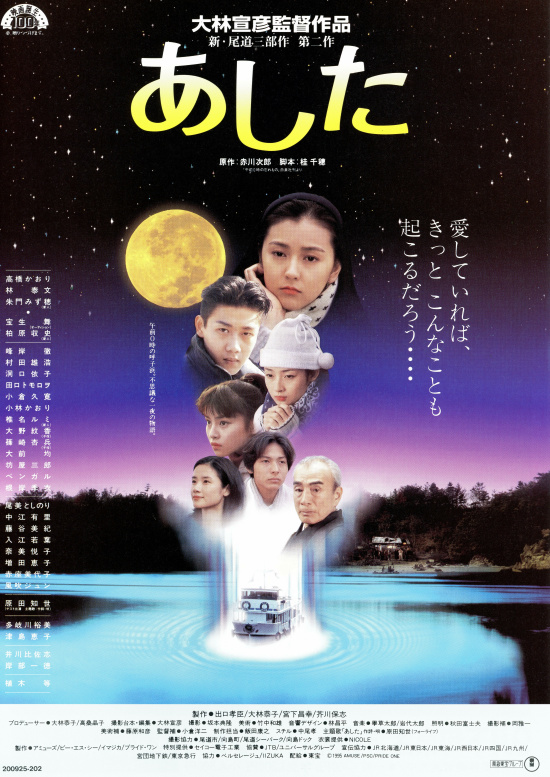 After completing his first “Onomichi Trilogy” in the 1980s, Obayashi returned a decade later for round two with another three films using his picturesque home town as a backdrop. Goodbye For Tomorrow (あした, Ashita) is the second of these, but unlike Chizuko’s Younger Sister or One Summer’s Day which both return to Obayashi’s concern with youth, Goodbye For Tomorrow casts its net a little wider as it explores the grief stricken inertia of a group of people from all ages and backgrounds left behind when a routine ferry journey turns into an unexpected tragedy.
After completing his first “Onomichi Trilogy” in the 1980s, Obayashi returned a decade later for round two with another three films using his picturesque home town as a backdrop. Goodbye For Tomorrow (あした, Ashita) is the second of these, but unlike Chizuko’s Younger Sister or One Summer’s Day which both return to Obayashi’s concern with youth, Goodbye For Tomorrow casts its net a little wider as it explores the grief stricken inertia of a group of people from all ages and backgrounds left behind when a routine ferry journey turns into an unexpected tragedy.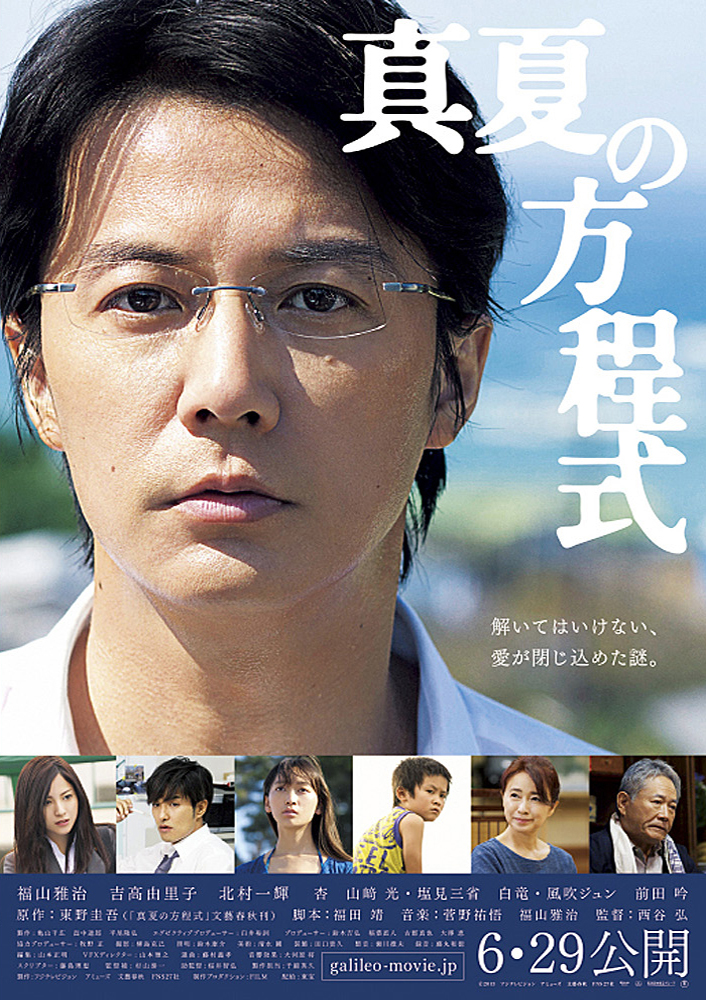 Sometimes it’s handy to know an omniscient genius detective, but then again sometimes it’s not. You have to wonder why people keep inviting famous detectives to their parties given what’s obviously going to unfold – they do rather seem to be a magnet for murders. Anyhow, the famous physicist and sometime consultant to Japan’s police force, “Galileo”, is about to have another busman’s holiday as he travels to a small coastal town which is currently holding a mediation between an offshore mining company and the local residents who are worried about the development’s effects on the area’s sea life.
Sometimes it’s handy to know an omniscient genius detective, but then again sometimes it’s not. You have to wonder why people keep inviting famous detectives to their parties given what’s obviously going to unfold – they do rather seem to be a magnet for murders. Anyhow, the famous physicist and sometime consultant to Japan’s police force, “Galileo”, is about to have another busman’s holiday as he travels to a small coastal town which is currently holding a mediation between an offshore mining company and the local residents who are worried about the development’s effects on the area’s sea life.
